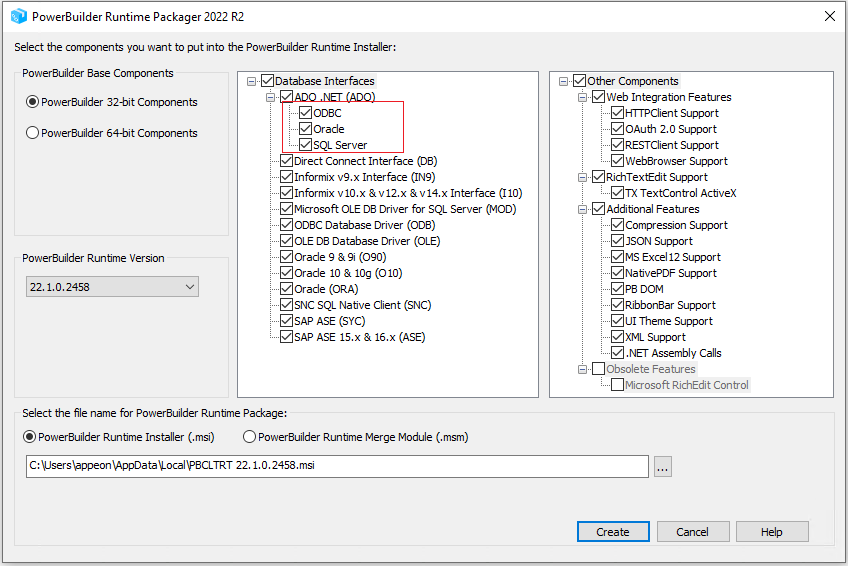To ensure your application connects properly with the database using ADO.NET, you must package and distribute the .NET Desktop Runtime and the PowerBuilder runtime files along with your application.
-
.NET Desktop Runtime
You will have to manually package and distribute .NET Desktop Runtime. (Make sure the platform (32-bit or 64-bit) of .NET Desktop Runtime matches that of the application executable file.)
.NET Desktop Runtime 6.0 is required if PowerBuilder 2022 R3 MR 3356 or earlier is used; .NET Desktop Runtime 8.0 is required if PowerBuilder 2022 R3 MR 3391 or later is used. If you want to use PowerBuilder IDE build 3391 or later (which supports .NET 6.0 & .NET 8.0) with an earlier PowerBuilder Runtime such as build 3356 (which supports .NET 6.0 only), you will need to manually replace some files, otherwise, features such as ADO.NET database connection and .NET Assembly Calls may not work properly. For detailed instructions, view here.
-
PowerBuilder runtime files
Besides .NET Desktop Runtime, you will also need to package and distribute the PowerBuilder runtime files, either in an automatic or manual way.
To package the files automatically, select the database type in the Runtime Packager so that the packager can automatically package the files according to the database type.
To package the files manually, go to the PowerBuilder Runtime location and get the files according to the following table.
Database type
Dependency files
ORACLE
pbDBDriver.dll
Appeon.DB.Proxy.dll
Appeon.DB.Proxy.runtimeconfig.json
Appeon.DB.Proxy.deps.json
Appeon.DB.Base.dll
Appeon.DB.Base.deps.json
Appeon.DB.Oracle.dll
Appeon.DB.Oracle.deps.json
Microsoft.Win32.SystemEvents.dll
System.Configuration.ConfigurationManager.dll
System.Diagnostics.PerformanceCounter.dll
System.DirectoryServices.dll
System.DirectoryServices.Protocols.dll
System.Drawing.Common.dll
System.Security.Cryptography.ProtectedData.dll
System.Security.Permissions.dll
System.Windows.Extensions.dll
Oracle.ManagedDataAccess.dll
SQL Server
pbDBDriver.dll
Appeon.DB.Proxy.dll
Appeon.DB.Proxy.runtimeconfig.json
Appeon.DB.Proxy.deps.json
Appeon.DB.Base.dll
Appeon.DB.Base.deps.json
Appeon.DB.SQLServer.dll
Appeon.DB.SQLServer.deps.json
Microsoft.Data.SqlClient.dll
Microsoft.Data.SqlClient.SNI.dll
Microsoft.Identity.Client.dll
Microsoft.SqlServer.Server.dll
System.Configuration.ConfigurationManager.dll
System.Security.Permissions.dll
Azure.Core.dll
Azure.Identity.dll
Microsoft.Bcl.AsyncInterfaces.dll
Microsoft.Identity.Client.Extensions.Msal.dll
Microsoft.IdentityModel.Abstractions.dll
Microsoft.IdentityModel.JsonWebTokens.dll
Microsoft.IdentityModel.Logging.dll
Microsoft.IdentityModel.Protocols.dll
Microsoft.IdentityModel.Protocols.OpenIdConnect.dll
Microsoft.IdentityModel.Tokens.dll
Microsoft.Win32.SystemEvents.dll
System.Drawing.Common.dll
System.IdentityModel.Tokens.Jwt.dll
System.Memory.Data.dll
System.Runtime.Caching.dll
System.Security.Cryptography.ProtectedData.dll
System.Windows.Extensions.dll
ODBC
pbDBDriver.dll
Appeon.DB.Proxy.dll
Appeon.DB.Proxy.runtimeconfig.json
Appeon.DB.Proxy.deps.json
Appeon.DB.Base.dll
Appeon.DB.Base.deps.json
Appeon.DB.Odbc.dll
Appeon.DB.Odbc.deps.json
System.Data.Odbc.dll



